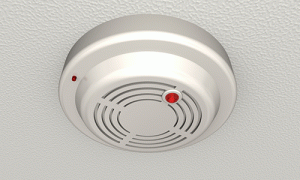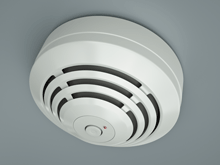 Despite Fresno’s mild climate, furnaces and fireplaces still enjoy popularity here. In a home with these or any other fuel-burning appliances, a carbon monoxide detector could save a life someday.
Despite Fresno’s mild climate, furnaces and fireplaces still enjoy popularity here. In a home with these or any other fuel-burning appliances, a carbon monoxide detector could save a life someday.
Donald P. Dick Air Conditioning Blog: Archive for the ‘CO Detectors’ Category
Why Carbon Monoxide Detectors are Important
Tuesday, November 17th, 2015IAQ 101: Carbon Monoxide Detector Testing Tips
Tuesday, April 21st, 2015You Could Be Vulnerable to Carbon Monoxide in Your Home
Tuesday, October 28th, 2014Add Carbon Monoxide Detectors and Protect Yourself From the Silent Killer
Thursday, October 9th, 2014 Carbon monoxide detectors can be your Fresno area home’s greatest material asset. This is because carbon monoxide (CO), produced as a by-product of incomplete combustion of fossil fuels, is an insidious killer. Recognize carbon monoxide’s risks and consider the benefits of installing carbon monoxide detectors in your home.
Carbon monoxide detectors can be your Fresno area home’s greatest material asset. This is because carbon monoxide (CO), produced as a by-product of incomplete combustion of fossil fuels, is an insidious killer. Recognize carbon monoxide’s risks and consider the benefits of installing carbon monoxide detectors in your home.
Shopping for a CO Monitor: Features to Consider
Tuesday, July 22nd, 2014 Carbon monoxide (CO) is a byproduct of the incomplete burning of common fuels, including the natural gas, propane, oil, coal and wood used in everyday home appliances and HVAC equipment. Exposure to carbon monoxide can cause serious health impacts, including death. Because CO is tasteless, odorless and colorless, your home should have at least one CO monitor – and preferably more – to keep you and your family safe from carbon monoxide poisoning.
Carbon monoxide (CO) is a byproduct of the incomplete burning of common fuels, including the natural gas, propane, oil, coal and wood used in everyday home appliances and HVAC equipment. Exposure to carbon monoxide can cause serious health impacts, including death. Because CO is tasteless, odorless and colorless, your home should have at least one CO monitor – and preferably more – to keep you and your family safe from carbon monoxide poisoning.
Carbon Monoxide in Your Home: Know Where to Check
Thursday, March 27th, 2014One of the biggest hazards in a modern home – especially one that uses gas-fueled appliances – is carbon monoxide (CO). It’s an odorless and colorless gas, meaning you have no way of detecting it yourself, without the help of a detection device. If you ingest enough CO at once, or over a long enough period of time, it can lead to illness or even death.
Carbon Monoxide Detectors: Ensure Proper Selection And Installation
Tuesday, March 19th, 2013 The State of California has a law that requires carbon monoxide detectors in all residential dwellings that use any kind of combustible fuel or that have attached garages. The law requires a carbon monoxide (CO) detector on all floors of the home. If you haven’t installed yours yet, use this as a guide to choosing and installing CO detectors so they give you the protection you need against carbon monoxide poisoning.
The State of California has a law that requires carbon monoxide detectors in all residential dwellings that use any kind of combustible fuel or that have attached garages. The law requires a carbon monoxide (CO) detector on all floors of the home. If you haven’t installed yours yet, use this as a guide to choosing and installing CO detectors so they give you the protection you need against carbon monoxide poisoning.
Is The Polluted Air From Your Garage Seeping Into Your Home?
Tuesday, January 29th, 2013If your home has an attached garage, you probably enjoy the convenience factor, but have you ever wondered whether contaminated air from your garage can seep into your home? When your house is not properly sealed against your garage, the health of yourself and your family may be compromised. By educating yourself on the threats posed by dirty air from your attached garage and taking measures to prevent its passage into your home, you can protect your household.
Carbon Monoxide Detectors A Must, But Practice These Common Sense Tips As Well
Thursday, November 22nd, 2012 With colder weather taking over in Central California, it’s important to take precautions against the increased threat of carbon monoxide poisoning. According to the U.S. Fire Administration, 150 people die each year from non-fire-related carbon monoxide poisoning. Most of these deaths were a result of faulty, poorly vented or misused fuel-burning appliances.
With colder weather taking over in Central California, it’s important to take precautions against the increased threat of carbon monoxide poisoning. According to the U.S. Fire Administration, 150 people die each year from non-fire-related carbon monoxide poisoning. Most of these deaths were a result of faulty, poorly vented or misused fuel-burning appliances.

 A necessary step in any home safety plan is working carbon monoxide detectors, and the only way to ensure they’re working is through regular testing. A carbon monoxide detector with a dead battery is worse than no detector at all, since it might impart a false sense of security.
A necessary step in any home safety plan is working carbon monoxide detectors, and the only way to ensure they’re working is through regular testing. A carbon monoxide detector with a dead battery is worse than no detector at all, since it might impart a false sense of security.  Being exposed to carbon monoxide (CO) in your home, even for just a short amount of time, can be very hazardous to you and your family, even potentially lethal. It’s important to take precautions against CO buildup, and know what to do in case this happens in your Fresno area home.
Being exposed to carbon monoxide (CO) in your home, even for just a short amount of time, can be very hazardous to you and your family, even potentially lethal. It’s important to take precautions against CO buildup, and know what to do in case this happens in your Fresno area home.  Carbon monoxide detectors are an essential safety instrument that should be installed in every home. You also need to make sure you position yours properly so that they are working optimally and constantly providing protection.
Carbon monoxide detectors are an essential safety instrument that should be installed in every home. You also need to make sure you position yours properly so that they are working optimally and constantly providing protection.